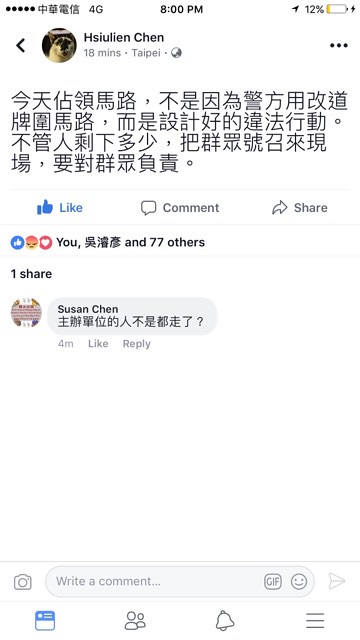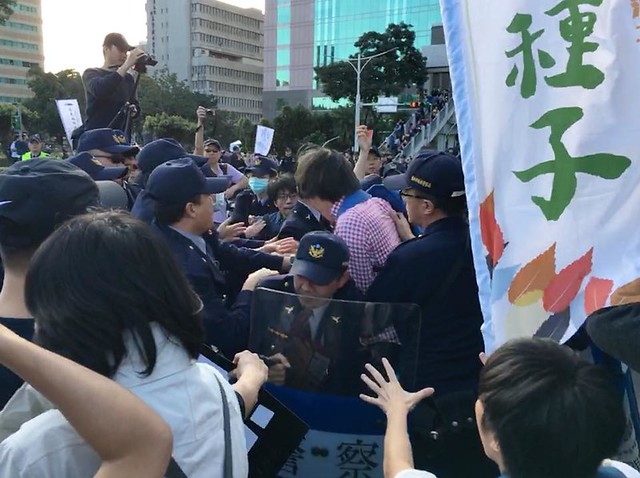There was an interesting piece in Taiwan News recently about why marriage equality, not the labor movement, is attracting demonstrators and catching the public eye. I would especially like to learn more about traditionally Taiwanese representations of gayness as I know basically nothing about it.
I don't agree with every conclusion - in fact, although marriage equality impacts a small segment of the population, it affects that segment in a huge way, and is something of a social litmus test for the kind of country Taiwan wants to be.
I do not think allowing bigots to score a point by allowing civil partnerships is the answer: first, because I don't believe in giving in to bigots (could you imagine telling, say, African Americans to compromise with racists during the Civil Rights Movement and accept less than full equal rights? This suggestion doesn't feel different), especially when they are a small minority with outsize influence that it's time we cut down, and secondly because it's a straight-up human rights issue.
So, I cannot accept the conclusion that we need to let marriage equality go and focus on labor: in fact, I think we should ramp up marriage equality, get it passed quickly, and then focus on labor. I am not a fan at all of the argument that we should delay conferring full civil rights on a group because they happen to be a small group and because some bigots don't like it. I do not think a new law - rather than amending the civil code - will bring about the realization that marriage equality is okay, leading to later change in the code. It'll get stuck there. We'll try to push for the civil code to be changed, only to be told "but we HAVE marriage equality, can't you just accept that and move on?" The bigots will not stop being bigots, they'll bring out the same old fight. It'll be a bureaucratic nightmare, a postponement of the real battle. I'm not into that, sorry.
My views, however, mean little - I can't vote and I can't organize. It's what the Taiwanese are inspired by that counts. I have a few anecdotal thoughts for why labor is not attracting crowds but marriage equality is:
The marriage equality crowd is a young crowd, many of whom do not intend to accept jobs with poor working conditions when they graduate.
This is the generation that gets involved in public life, that goes abroad, that starts their own business, that goes freelance, that moves back to their hometown to open a cafe or run their family business. Some of them are surely on the naive side, thinking they have an escape route from the hell that is a typical job in Taiwan, and some will likely come to regret their idealistic assumptions. For many, however, that is a fuzzy eventuality, a gray cloud on the horizon. They have gay friends now, this means more to them.
Turton is right about one thing, though: marriage equality is cool and trendy and progressive, but labor movements often call to mind the sad reality that most of us eventually end up working for The Man. They're not young, hip or cool (and, as the article also got right, they don't tap into an identity one can display through consumption). When you either don't want to think about your eventual working life, or don't think it will happen to you because you'll never be stuck in some interminable cube monkey job, your heart is just not going to be in a labor protest.
I just don't happen to think all of that identity-broadcasting done by demonstrating for marriage equality is necessarily a bad thing. We all do things to display our identity. I do it, Turton does it, we all do it. For some, it really is a representation of who they are (if you're gayer than a Christmas tree and act like it, then is that not authentic rather than an identity you have chosen to display through consumption? If you really are someone whose fire gets lit by human rights causes, as I am, are you not being authentic in displaying that identity even if through consumerist means?
This is about more than just being fashionable, or a way to display an identityA friend pointed this out, and I agree. Yes, there is consumption, identity display and some amount of being attached to a fashionable cause when it comes to marriage equality, but 250,000 people don't turn out on a Saturday for that reason alone. It is far more than the core LGBT+ fighting for equal rights and other activists passionate about the cause, and shows a deeper engagement than just being trendy or hip. You might get a few of those, but you don't get 250,000, especially when they were not brought out by tight, cohesive church networks the way the anti-equality folks were with their far smaller numbers, if it's just people showing off how cool and progressive they are. People do care, there is real support, and it does go deeper than strutting around in order to cement an identity for oneself.
Honestly, the labor movement doesn't get the word out effectively.
I don't know about you guys, but I always hear about marriage equality events well in advance, and can plan to attend them. Labor protests?
I read about them the next day from Brian Hioe, or see them happening when I am already in my pajamas. I don't know until it's too late that I could have been there. I don't know how they hope to attract more people if people don't even know something is going on.
Marriage equality seems solvable, labor issues do not
I think a lot of activists know they have society and even much of the government on their side in the marriage equality debate. They know this is winnable. They know it's winnable soon - a big victory in a short time over an opponent that is outmatched. The fight against the Boss Class will be a long, grueling, interminable one with a huge amount of media, money, crony capitalists, corrupt politicians and straight-up asshats bearing down on them. It will be another Sunflower Movement, if we let it get that far (
and I do think labor has the potential to be that, but few seem to agree) - an angry group of activists up against insane odds. Perhaps the nation is still a bit hungover from the last big movement, and wants a break, to achieve something that can actually be done.
Hell, the New Power Party has a pretty strong labor platform (though as always I do not agree with their past resistance to relaxing the laws governing foreign workers), and they can't seem to get anywhere. If they can't bring the crowds, or effectively stand up to the Boss Class, how can anyone?
Marriage equality, though? Dude, we can do that.
It's not really clear, due to deliberate muddling, what the labor movement really means or stands for
Which labor movement are we even talking about? The one opposed to pension reform? The tour guide protest? The
fakey-fake "Sunflower imitation" protests
the KMT organizes because it just does not get civil society at all? Or the real labor protests? It's easy to be confused. I often have to think hard about a demonstration - if I even know it's going to happen - to see if this is a group I actually agree with, or just more civil servants unhappy about pension reform when most workers in the private sector don't even have pensions, or only nominally do. The labor movement needs to clarify who they are, what they want and who they are not, or they're just not going to bring the crowds.
Workers themselves seem to vacillate between grumbling about the situation - and I agree that it is dire - and talking about how "this is just the way things are", not complaining, not talking to their bosses, not going to the company to air grievances. If workers won't even tell their bosses what they don't like, how can we expect them to get riled up enough to protest? And how can we expect others to come out on behalf of them when they won't stand up for themselves at work?
The fight for more vacation days was, to be honest, uninspiring
I'm sorry, I just can't work up a lot of screaming, placard-waving enthusiasm over keeping
Chiang Kai Stupid Shek's Stupid Birthday. I know a vacation day is a vacation day and I shouldn't fret so much, but...I just can't get over that. I don't know about the rest of the Taiwanese public, but it's not a galvanizing message.
Add to that the fact that we've only had these extra seven days for one year: in the past ten years in Taiwan I never had those days off, and suddenly I do. It's very confusing, and I don't feel passionately about keeping them because they sort of randomly appeared this year rather than being something I'm used to that fits into the rhythm of the year.
So, it just doesn't seem like a smart route to go in terms of igniting a fire in people to come out and fight.
It is uninspiring to fight for better labor laws when the ones we have are not enforced.
A friend brought up this point (and the point above about workers who don't complain) and I agree enough to include it. Sure, we need better laws, but what good is it if the ones we already have are more or less never enforced? Who cares if a new law limits overtime if you can't get your boss to abide by the current laws regulating overtime? What are we fighting for, exactly?
That young marriage equality crowd has free time, workers just have stress
...and workers generally do not.
Those that do face family pressure - always a big deal here - to keep their shitty job and not rock the boat, or to 'take what you can get'. It's a society that is very accepting of market trends in terms of how workers are treated - in the US the left screams and howls, rightfully so, when capitalists say that a fair wage is the lowest wage someone is willing to work for, but Taiwan is far more accepting of this explanation. Something about that "this is the best we can do, this is the market, we have to accept it" attitude has to change.
Workers are also less idealistic. They've done jobs, they know how the world is and how most of us eventually get sucked in (for the record, I'm in my 30s and have still managed to not get sucked in, but I may well die old and poor). They are often focused on themselves and their families - by then, most have them - and improving their own lot rather than fighting for the betterment of all. This is another attitude we have to change.
In the meantime, though?
Honestly, you'll find me in the street, rainbow flag in hand.



